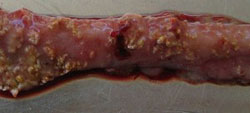



Poultry CRC Aims to Develop Necrotic Enteritis Vaccine
AUSTRALIA - Clinical necrotic enteritis (NE) massively damages the lining of a chicken’s intestine, causing disease and, often, death, according to a report from Poultry CRC.Sub-clinical NE, while not demonstrating the characteristic clinical symptoms of severe lesions, impairs the intestine’s ability to absorb nutrients and results in illness and poor growth, potentially accounting for over 90 per cent of the economic losses suffered by chicken growers.
Necrotic enteritis has traditionally been controlled by in-feed antibiotics, coupled with good management practices. However much of Europe is moving away from this treatment, while, in countries like Australia, there is a rapid expansion of the free range broiler sector, which prohibits the use of in-feed antibiotics. These changes have led to an increase in the incidence and severity of NE outbreaks.


To counter this, the Poultry CRC is seeking to produce a truly effective vaccine for NE from a number of possible vaccine formulations. If successful, this work will bring to fruition earlier CRC research into the causes of the disease, and the nature of its causative agent, the bacterium Clostridium perfringens. This vaccine development research is being undertaken as a collaborative project between CSIRO’s Drs Rob Moore and Anthony Keyburn, and Monash University’s Professor Julian Rood.
As Dr Moore explains, “Our first goal was to show that we had a vaccine formulation that was effective in reducing disease levels, and we have achieved that. We’ve shown useful levels of vaccine efficacy when young chicks are directly vaccinated”.
However, it just isn’t economically feasible to pick-up and individually vaccinate every broiler chick. So the next step for this project is to demonstrate that broiler hens can be vaccinated in order to produce antibodies in the egg capable of protecting the chicks in the critical early weeks of life. “Success at this stage will mean we have a vaccine ready for use in industry,” adds Dr Moore. “Our aim is to produce a vaccine that will not only protect birds from the serious gut damage that C. perfringens can inflict (pictured), but also stop the sub-clinical infections that can cause substantial productivity losses,” he concluded.
As the CRC’s Commercial Manager, Lloyd Thomson, comments, “There is a significant level of interest in this work from animal health companies, which, given the mixed results experienced previously with NE vaccines in the poultry industry, is entirely understandable. If Julian, Rob and Anthony can develop a genuinely effective, easily administered vaccine, we are confident it will dramatically reduce the impact of NE, which costs in excess of two billion US dollars each year for the global chicken meat industry, based on an estimate from the year 2000."
Further Reading
| |
- | Find out more information on Necrotic Enteritis by clicking here. |








